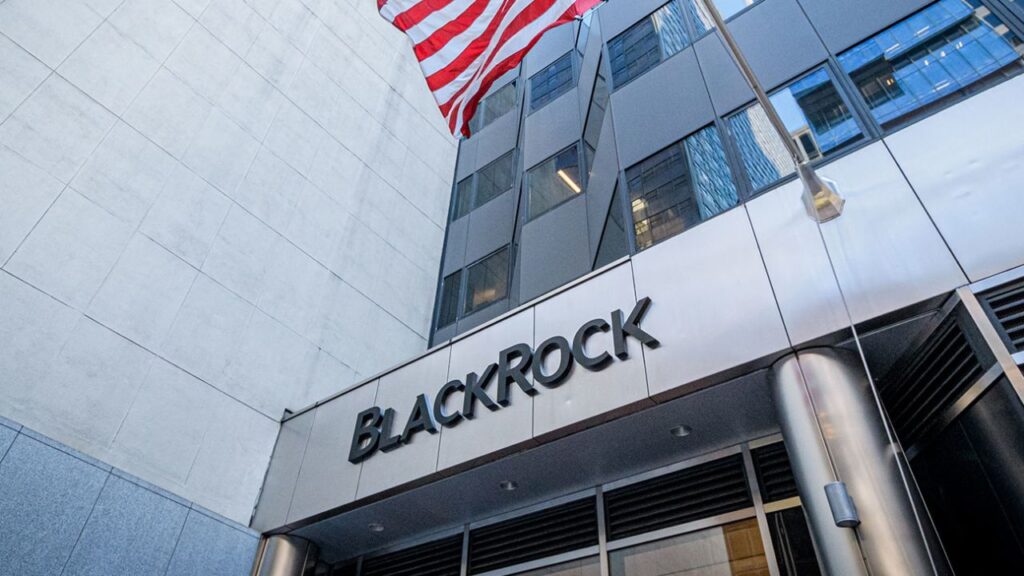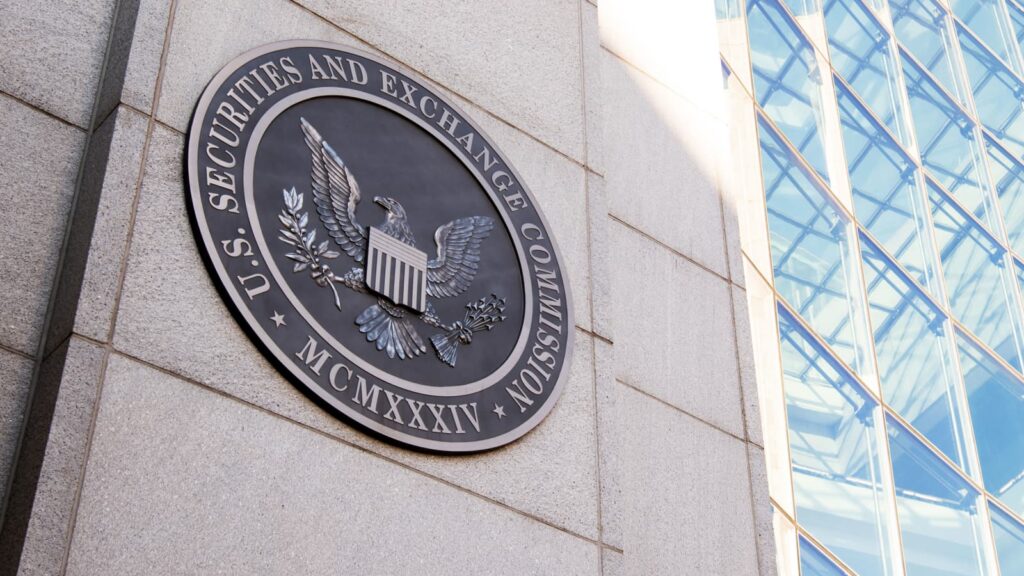BlackRock, the world’s largest asset manager, is set to reduce its global workforce by approximately 3% in the coming days, according to reports.
This decision coincides with BlackRock’s optimism regarding its spot Bitcoin exchange-traded fund (ETF) application pending approval from the United States Securities and Exchange Commission (SEC).
Sources familiar with the matter have informed Fox Business, as of January 6th, that BlackRock intends to lay off roughly 600 employees as part of its routine internal adjustments, with decisions based on employee performance evaluations from the past 12 months.
BlackRock anticipates that the SEC will approve its Bitcoin ETF application on January 10th, which also marks the SEC’s deadline for deciding on the ARK 21 Shares spot Bitcoin ETF.
However, it’s important to note that the SEC’s official deadline for BlackRock’s application isn’t until January 15th.
This development follows a flurry of amendment forms recently filed with the SEC by spot Bitcoin ETF applicants.
BlackRock’s submission coincided with those of other asset managers, including Valkyrie, Grayscale, Bitwise, Hashdex, ARK 21Shares, Invesco Galaxy, Fidelity, Franklin Templeton, VanEck, and WisdomTree.
READ MORE: Grayscale in Talks with JPMorgan and Goldman Sachs for Proposed Spot Bitcoin ETF Partnership
These filings represent one of the final steps in the SEC approval process, allowing U.S. exchanges to list shares of investment securities directly tied to cryptocurrency.
Notably, in December 2023, Cointelegraph reported that BlackRock had made adjustments to its Bitcoin ETF application with the goal of increasing Wall Street banks’ participation.
They achieved this by introducing new shares within the fund that can be purchased with cash, rather than just cryptocurrency.
This in-kind redemption model allows major banks to act as authorized participants for the fund, thereby bypassing restrictions that previously prevented them from holding Bitcoin or crypto directly on their balance sheets.
In summary, BlackRock is streamlining its workforce as it awaits a potential SEC approval for its Bitcoin ETF application.
This move aligns with broader efforts to make cryptocurrency investments more accessible to traditional financial institutions, potentially opening up new avenues for institutional participation in the crypto market.
An anonymous Bitcoin user has made waves in the cryptocurrency world by transferring 26.9 Bitcoin, valued at approximately $1.17 million, to the legendary genesis wallet.
This wallet holds a special place in Bitcoin history as it was the first-ever wallet created on the Bitcoin network by the enigmatic Satoshi Nakamoto, the pseudonymous inventor of Bitcoin.
The intriguing Bitcoin transaction took place on January 5th at 1:52 am Eastern Time.
What makes this transaction stand out is the substantial transaction fee of $100, considerably higher than the typical fees associated with Bitcoin transfers.
READ MORE: Traders Gamble on Bitcoin ETF Approval with $1.5 Million in Bets on Polymarket
This unusual fee has raised eyebrows and sparked speculation within the cryptocurrency community.
The genesis wallet’s funding history is equally fascinating. Initially, it received funds from the consolidation of assets from three separate wallets, which were subsequently distributed to a total of 12 other wallets.
Most of the funds involved in this process were traced back to a wallet associated with Binance, a well-known cryptocurrency exchange, as identified by Arkham Intelligence, a blockchain analytics platform.
Conor Grogan, a director at Coinbase, couldn’t help but voice his thoughts on this mysterious transaction.
As anticipation builds within the cryptocurrency community for the United States Securities and Exchange Commission’s (SEC) forthcoming decision regarding spot Bitcoin exchange-traded fund (ETF) applications, a unique form of speculation has emerged.
Traders are seizing this moment of suspense to wager on the approval outcome by January 15.
On the decentralized gambling platform Polymarket, which operates on the Polygon blockchain, traders are placing their bets with a simple “Yes” or “No” on whether the Bitcoin ETF applications will receive approval.
Presently, approximately $1.5 million worth of bets have been staked, and the majority of traders are favoring the “Yes” outcome.
The value of each share on Polymarket represents the odds of the respective approval or rejection, mirroring the volatility of the crypto market.
At the time of writing, a “Yes” share costs $0.79, while a “No” share is priced at $0.21.
An anonymous top holder known as “kiwi” has invested around $421,000 in “Yes” shares, while the leading holder for “No” holds only about $15,000 in “No” shares.
Polymarket has set the resolution date for January 15, 2024, at 11:59:59 pm Eastern Time, stating that the market will resolve as “Yes” if any spot Bitcoin ETF gains SEC approval by that deadline; otherwise, it will resolve as “No.”
READ MORE: South Korea Proposes Ban on Credit Card Purchases of Cryptocurrency to Combat Money Laundering
This implies that holders of either bet will experience either gains or losses based on the outcome by the stipulated deadline.
The platform asserts that the primary source for market resolution will be information directly from the SEC.
However, it also mentions the possibility of using a consensus of credible reporting sources to determine the market outcome.
While some members of the cryptocurrency community have criticized this betting activity, others have adopted a more humorous approach.
In a Cryptocurrency subreddit, one user referred to the bets as “putting up dollars to win dimes,” characterizing them as somewhat irrational.
Conversely, another community member humorously claimed they were about to lose their child’s college fund, while yet another apologized to their “crypto grandkids” for their impending actions.
As the crypto world watches and waits for the SEC’s decision, Polymarket’s speculative market serves as a unique reflection of the crypto community’s sentiment and willingness to take risks on significant developments in the space.
Arthur Hayes, a prominent figure in Bitcoin trading, has issued a warning, predicting a potential 30% to 40% crash in BTC prices in March.
In a blog post on January 4th, the former CEO of BitMEX highlighted the likelihood of a turbulent week in financial markets.
While Bitcoin enthusiasts have been optimistic due to the expected regulatory approval of the United States’ first spot Bitcoin exchange-traded funds (ETFs) and the upcoming block subsidy halving in April, Hayes believes that challenges lie ahead.
Hayes attributes his caution to the actions of the U.S. Federal Reserve, which is trying to stabilize an economy grappling with inflation and instability.
In March, the Fed’s Bank Term Funding Program (BTFP), established in response to the 2023 regional banking crisis, is set to expire. Shortly thereafter, the Federal Open Market Committee (FOMC) will decide on interest rates.
Hayes commented, “If my forecast is correct, the market will bankrupt a few banks within that period, forcing the Fed into cutting rates and announcing the resumption of the BTFP.”
Bitcoin and the broader crypto market are highly responsive to changes in macro liquidity, and a Fed bailout could aid them after an initial shock akin to the 2023 volatility.
READ MORE: Bitcoin ETF Approval Odds Remain High Despite SEC’s Need for More Time
However, Hayes believes that Bitcoin will rebound before the Fed meeting, asserting that it is the only neutral reserve hard currency not tied to the banking system, and it is traded globally.
He emphasized that Bitcoin knows the Fed always responds with liquidity injections in times of crisis.
Hayes anticipates a potential drop in BTC/USD prices ranging from 20% to 30% as March begins but believes that the upcoming halving will ultimately act as a catalyst for further price increases.
He cautiously stated that he won’t buy Bitcoin until after the critical March decision dates have passed.
The crypto community remains divided on the impact of ETF approvals. Concerns about potential rejections have already caused a nearly 10% drop in Bitcoin prices.
Some analysts argue that Bitcoin is due for a substantial correction, irrespective of ETF approval.
However, John Bollinger, the creator of the Bollinger Bands volatility indicator, predicts a positive reaction based on his tool’s readings, suggesting that Bitcoin might break higher in the near future.
Cipher Mining, a prominent player in the Bitcoin mining industry, has taken a significant step towards solidifying its position by acquiring 16,700 state-of-the-art Avalon A1466 miners.
These mining machines are set to be delivered in the second quarter, strategically timed to coincide with the highly anticipated Bitcoin halving event, expected in April.
This move underscores Cipher Mining’s ambition to emerge as a key player in the industry during this pivotal moment.
The purchase agreement was brokered with Canaan, the company responsible for manufacturing the Avalon A1466 miners, and involved a joint venture between Bear LLC and Chief Mountain LLC.
Cipher Mining holds a 49% stake in this joint venture, which will see the installation of half of these miners at the Bear facility and the remaining half at the Chief facility.
This expansion will contribute an additional 30 megawatts, equivalent to 1.25 exahashes per second (EH/s), to each of these mining centers.
Upon completion of this expansion, Cipher Mining’s total self-mining capacity will reach an impressive 8.4 EH/s.
The CEO of Cipher Mining, Tyler Page, emphasized the strategic importance of this acquisition, explaining that it positions the company for substantial growth, particularly in light of the Bitcoin halving event.
Historically, this event has been accompanied by a surge in Bitcoin’s price.
READ MORE: Record-Breaking Cryptocurrency Thefts in December 2023 Total Nearly $100 Million
Although the exact financial details of the 16,700 miner purchase were not disclosed, Cipher Mining expressed satisfaction with the favorable terms of the agreement, highlighting that the timing aligned with the market cycle for mining machines.
This isn’t the first time Cipher Mining has collaborated with Canaan. In the past, the company purchased a stack of Canaan machines, which performed admirably even in the scorching Texas summer heat, with temperatures reaching as high as 119 degrees Fahrenheit (48.3 degrees Celsius) in 2023.
In a separate transaction last year, Cipher Mining acquired 37,396 units of the latest Antminer T21 miners from Bitmain, amounting to a total investment of $99.5 million and adding 7.1 EH/s of self-mining capacity. However, delivery of these miners is expected in the first half of 2025.
Cipher Mining’s mining operations demonstrated consistent growth, with 465 BTC mined in December, marking a 7.4% increase from the previous month.
Currently, the company holds 796 BTC on its balance sheet, valued at approximately $34 million.
In terms of market performance, Cipher Mining’s share price (CIFR) experienced a remarkable rebound in 2023, surging by 638% from $0.56 to $4.13.
This impressive resurgence followed a challenging 2022 when CIFR plummeted by 88%.
With a current market capitalization of $1.01 billion, Cipher Mining is now trailing only behind Marathon Digital Holdings, Riot Platforms, CleanSpark, and Hut 8 Mining in the Bitcoin mining sector.
Grayscale Investments, a prominent crypto asset manager, is reportedly engaging in discussions with notable firms such as JPMorgan and Goldman Sachs regarding potential involvement in its proposed spot Bitcoin exchange-traded fund (ETF).
According to sources familiar with the matter, Bloomberg reported this development on January 4.
These discussions have surfaced shortly after Grayscale filed an amended S-3 application with the United States Securities and Exchange Commission (SEC), which notably did not specify any authorized participants.
Simultaneously, an earlier media report has indicated that Goldman Sachs is in talks with BlackRock, aiming to assume the role of an authorized participant for BlackRock’s ETF, citing inside sources.
An authorized participant plays a pivotal role in the management of an ETF, facilitating the creation and redemption of shares within the fund.
ETF issuers can appoint multiple financial institutions as authorized participants.
Notably, ETF applicants are not obliged to disclose their authorized participants in their S-1 or S-3 filings, which implies that other financial entities may still join in the future.
READ MORE: Global Bitcoin ATM Count Falls by 11.1% in 2023, Breaking 10-Year Growth Streak
While JPMorgan has already been designated as an authorized participant for several proposed spot Bitcoin ETFs, Goldman Sachs may soon join the ranks of other Wall Street giants, including Cantor Fitzgerald and Jane Street, which have previously secured authorized participant roles for other ETF issuers.
Goldman Sachs has historically maintained a neutral stance regarding cryptocurrencies and the digital asset sector.
Matthew McDermott, the Head of Digital Assets at Goldman Sachs, emphasized in a December 27 interview with Fox Business that the approval of a Bitcoin ETF would contribute to the maturation of the crypto market and attract increased institutional investment into digital assets on a broader scale.
Notably, a spot Bitcoin ETF has never received approval in the United States.
Nevertheless, experts in the ETF industry anticipate a 90% likelihood of approval before January 10.
Presently, there are 14 asset managers seeking to launch a spot Bitcoin ETF.
This development would offer institutional investors a regulated and direct avenue to gain exposure to Bitcoin within the United States.
Speculation regarding the approval of a Bitcoin exchange-traded fund (ETF) by the SEC has surged on social media, with anticipation mounting for a potential announcement on Friday.
Fueling these expectations, a tweet from Grayscale’s legal chief mentioning that he was “just filling out some forms,” along with a widely shared tweet from a reporter, has intensified the speculation of an imminent approval.
While some analysts foresee the possibility of approvals as soon as the next day, others suggest that we might have to wait until the following week.
TechCrunch reporter Jacquelyn Melinek, in a January 4th post on X (formerly Twitter), cited sources “extremely close to the matter” and indicated that she was “expecting something tomorrow,” hinting at the potential approval of multiple ETFs.
One tweet that has caught the attention of many is from Grayscale’s chief legal officer, who cryptically mentioned that he was “just filling out some forms.”
This tweet has garnered significant attention with 1.9 million views and 6,700 likes since its posting.
Social media is buzzing with the hashtag #BTCETF and discussions around “Bitcoin ETFs,” while the price of Bitcoin has also experienced an uptick of 3.4% in the last 24 hours, following a sharp drop on January 3rd, according to TradingView data.
READ MORE: South Korea Proposes Ban on Credit Card Purchases of Cryptocurrency to Combat Money Laundering
However, not everyone is convinced of an immediate approval. Trader Scott Melkor acknowledges the vigorous rumor mill but remains cautious.
Bloomberg ETF analyst James Seyffart views much of the January 5th approval speculation as noise and anticipates approval to arrive between January 8th and 10th.
Attorney Joe Carlasare points out that the public comment period for several ETF applications extends until midnight on January 5th, making it “very unlikely” for approval to occur before the start of the next week in his view.
Eric Balchunas, senior Bloomberg ETF analyst, reveals that the SEC is in the process of providing final comments, and issuers are expected to file their final 19b-4 and S-1 forms soon.
Both forms must gain SEC approval before the ETF can commence trading, with the 19b-4 form being particularly crucial for the spot Bitcoin ETF’s effective approval.
Scott Johnsson, general partner at VB Capital, remains skeptical about an ETF approval before the next week, unless all 19b-4 applications are already clear and the SEC is open to simultaneous approvals.
Currently, 14 issuers are competing for the approval of a Bitcoin ETF, including BlackRock, Valkyrie, ARK Invest/21 Shares, Bitwise, and Fidelity.
Investors and enthusiasts alike eagerly await the SEC’s decision, which could have a significant impact on the cryptocurrency market.
Tuttle Capital Management, an Exchange-traded fund (ETF) issuer, has taken a bold step by filing for six leveraged and inverse Bitcoin ETFs with the United States Securities and Exchange Commission (SEC).
These filings aim to provide investors with the opportunity to benefit from amplified returns in the world of Bitcoin, even before the approval of a traditional spot Bitcoin ETF.
On January 3rd, Tuttle submitted three N1-A forms to the SEC.
These forms are typically used by investment companies to create new open-ended mutual funds.
Bloomberg Intelligence ETF analyst Henry Jim shared the news on X (formerly Twitter) and revealed an effective date of March 18, 2024.
This move showcases Tuttle’s eagerness to capitalize on the growing interest in cryptocurrency investments.
Fellow Bloomberg ETF analyst James Seyffart echoed this sentiment by highlighting Tuttle’s proactive approach, as they have already filed for six leveraged Bitcoin ETFs, despite the absence of an approved spot ETF.
This demonstrates their commitment to innovation in the ETF space.
READ MORE: Spot Bitcoin ETF Transparency Becomes Key Competitive Factor in Race for Approval
The six proposed Bitcoin ETFs include T-REX 1.5X, 1.75X, and 2X Long Spot Bitcoin Daily Target ETFs, along with T-REX 1.5X, 1.75X, and 2X Inverse Spot Bitcoin Daily Target ETFs.
These funds aim to deliver daily results with leveraged or inverse strategies, offering potential returns of up to 150% (for the 1.5X product) and 200% (for the 2X product).
Tuttle plans to initially use BlackRock’s prospective iShares spot Bitcoin ETF as the reference asset for swap agreements, though they may consider changing this reference asset in the future.
It’s important to note that these ETFs come with higher risk compared to non-leveraged alternatives because they magnify the performance of the underlying security, which in this case is Bitcoin, known for its price volatility.
Tuttle has not yet disclosed the proposed ticker symbols or set management fees for these ETFs. Further inquiries have been made to Tuttle for additional information.
Currently, Tuttle manages seven listed ETFs with a total of $96 million in assets, as per data from Stock Analysis. Among their existing products are the T-REX 2X Long Tesla Daily Target ETF (TSLT) and the T-REX 2X Long NVIDIA Daily Target ETF (NVDX).
The addition of leveraged and inverse Bitcoin ETFs to their portfolio reflects their commitment to diversifying investment options and addressing the evolving needs of investors in the cryptocurrency space.
Bitcoin’s sudden drop of $4,000 within hours is not solely due to panic surrounding the United States regulators’ potential rejection of a spot exchange-traded fund (ETF), according to prominent commentators.
This flash crash led to liquidations of over half a billion dollars in cryptocurrency positions.
The decline in Bitcoin’s price, nearly 9% of its value, coincided with the cryptocurrency’s 15th anniversary on January 3, as reported by Cointelegraph Markets Pro and TradingView.
CoinGlass, a statistics resource, reported long liquidations amounting to $514 million on the same day.
Matrixport, a crypto financial services platform, released a report asserting that the U.S. Securities and Exchange Commission (SEC) is likely to reject the spot ETF.
The report claimed that an ETF approval would catalyze crypto adoption, but the SEC chairman, Gensler, expressed the need for stricter compliance in the industry, implying that there is no political incentive to legitimize Bitcoin as an alternative store of value through a spot ETF.
READ MORE: Global Bitcoin ATM Count Falls by 11.1% in 2023, Breaking 10-Year Growth Streak
However, the report lacked concrete evidence to support its claim, and the official window for the SEC’s decision on the ETF is set from January 4 to January 10.
Some market experts, including trader and podcast host Scott Melker, questioned the rationale behind Matrixport’s perspective.
Others argued that the liquidations observed during the price drop were typical of Bitcoin’s behavior in a bull market.
Joe Carlasare, a crypto-focused litigator, dismissed the idea that the ETF report triggered the sell-off, attributing it instead to the market being overbought and in need of a liquidity squeeze.
Matrixport, anticipating a possible rejection by the SEC, predicted only a modest further decline in Bitcoin’s price.
If the SEC denies approval, the report anticipates cascading liquidations, potentially causing a rapid 20% decrease in Bitcoin’s value, bringing it back to the $36,000-$38,000 range.
As previously reported by Cointelegraph, analysts had already identified the mid-to-low $30,000 range as a likely support level for Bitcoin’s price.
The Chicago Board Options Exchange (CBOE), America’s largest options exchange, anticipates that spot Bitcoin exchange-traded funds (ETFs) will usher in a fresh wave of institutional investors.
In a recent interview on Bloomberg TV, CBOE Digital President John Palmer articulated that the approval of such ETFs would not only facilitate greater institutional participation but also stimulate retail interest in Bitcoin derivatives.
Palmer emphasized that this approval could potentially pave the way for pension funds and RIA-based (Registered Investment Advisor) funds to directly invest in spot Bitcoin ETF assets.
Currently, many of these funds face limitations in gaining direct exposure to Bitcoin. He further explained that RIAs are entities registered with federal or state regulatory agencies, specializing in offering investment advice.
As the deadline for the Securities and Exchange Commission (SEC) to decide on the ARK Invest 21 Shares Bitcoin ETF application approaches on January 10, Palmer believes that if approved, Bitcoin derivative products will experience significant expansion.
Institutional players are expected to increasingly utilize these derivatives for risk management purposes.
Palmer acknowledged the difficulty in predicting the exact breakdown of investors but noted that institutions are at the forefront of accessing hedging tools.
READ MORE: Bitcoin Price Prediction: AI Suggests Potential $100,000 Milestone by 2024
Nevertheless, he expects retail investors to also show interest in these instruments.
CBOE Digital, the cryptocurrency division of the exchange, currently offers crypto futures and options trading.
On January 11, it plans to launch margined Bitcoin and Ether derivatives trading, allowing investors to trade these contracts without the requirement of providing the full collateral.
Simultaneously, some mutual funds are already strategizing to increase their exposure to spot Bitcoin ETFs upon approval.
On January 2, Advisors Preferred Trust, a mutual fund manager, modified its prospectus to allow the fund to invest up to 15% of its total assets indirectly in Bitcoin.
This exposure would be achieved through investments in shares of Grayscale Bitcoin Trust, ProShares Bitcoin Strategy ETF, and Bitcoin futures contracts.
In conclusion, the potential approval of spot Bitcoin ETFs is poised to reshape the landscape of institutional and retail investments in cryptocurrencies, providing greater accessibility and hedging opportunities for a broader range of investors.








